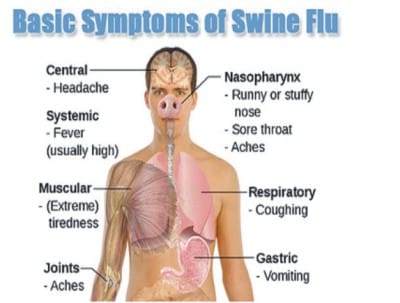What is swine flu?

Like people, pigs can get influenza (flu), but swine flu viruses aren't the same as human flu viruses. Swine flu doesn't often infect people, and the rare human cases that occurred in the past mainly affected people who had direct contact with pigs. But the current "swine flu" outbreak is different. It's caused by a new swine flu virus that has changed in ways that allow it to spread from person to person -- and it's happening among people who haven't had any contact with pigs.
That makes it a human flu virus. To distinguish it both from flu viruses that infect mainly pigs and from the seasonal influenza A H1N1 viruses that have been in circulation for many years, the CDC calls the virus "novel influenza A (H1N1) virus" and the World Health Organization calls it "pandemic (H1N1) 2009."
Symptoms of swine flu are like regular flu symptoms and include fever, cough, sore throat, runny nose, body aches, headache, chills, and fatigue. Many people with swine flu have had diarrhoea and vomiting. Nearly everyone with flu has at least two of these symptoms. But these symptoms can also be caused by many other conditions. That means that you and your doctor can't know, just based on your symptoms, if you've got swine flu. Health care professionals may offer a rapid flu test, although a negative result doesn't necessarily mean you don't have the flu.
Like seasonal flu, pandemic swine flu can cause neurological symptoms in children. These events are rare, but, as cases associated with seasonal flu have shown, they can be very severe and often fatal.
Only lab tests can definitively show whether you've got swine flu. Health departments can do these tests. But given the large volume of samples coming in, these tests are being reserved for patients with severe flu symptoms. Currently, doctors are preserving antiviral drugs for people with or at risk of severe influenza.

 For all latest news, follow The Daily Star's Google News channel.
For all latest news, follow The Daily Star's Google News channel. 



Comments